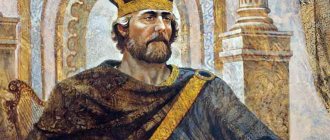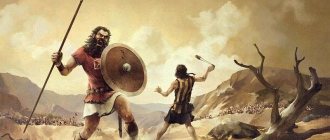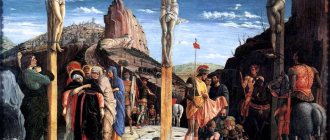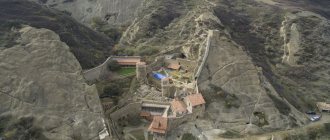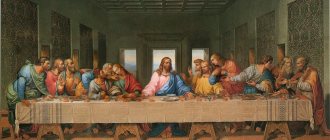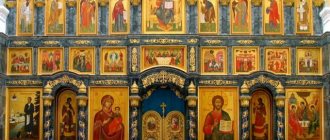photo: daverphillips.com
Solomon's Temple will go down in history as a grandiose structure. In fact, in size it was no larger than the Assumption Cathedral in the Moscow Kremlin, and, by the way, the interior was designed very similar.
Why exactly did King Solomon build the first temple of God for his people? What was the legendary wisdom of King Solomon? Could he actually be the author of the Book of Ecclesiastes and the Song of Songs? How many wives were in King Solomon's harem and how did they force him to worship idols, and why is Solomon still considered an ideal ruler?
The great Israeli king David, in his declining years, is trying to be overthrown from the throne by his eldest sons. First Absalom, then Adonijah, but both are defeated. David appoints as his successor his 10th son, Solomon, born of Bathsheba, the same strange wife whom the king once brought to the palace.
“Even in the Gospel, the evangelist Matthew, conducting the genealogy of Jesus Christ, specifically emphasizes that Bathsheba is the same, another man’s wife, taken by David, who was the mother of Solomon. The future king and, accordingly, the ancestor of Christ according to the flesh. Perhaps this is noted because it is very important to draw not an ideal portrait of an ideal king, but a realistic portrait of a living person and draw some lessons from this.”
Prince Solomon, who knew neither wars nor hardships, ascends the throne as a twenty-year-old youth. According to the Bible, the Lord God himself appears to the young king in a dream and promises to fulfill his every desire. Solomon asks for one thing - wisdom, for which he receives wealth and glory in addition.
“In our tradition, Solomon is the most intelligent person who has ever lived on earth. According to legend, he could speak not only all human languages, but also animal languages. He was also a fair judge. For example, one day two women came to him with one child. They both recently gave birth, but one of them had a child who died, and each insisted that the living child was her child. Solomon said: “Cut the child and give each one half.” And the woman whose child had died said, “Okay, let’s do it.” - And the other woman said. “No, no, give the child to her, just don’t kill him.” And so it immediately became clear which of them was the real mother,” Amir Orly, biblical scholar, Jerusalem.
Solomon is considered the author of 3,000 proverbs and several biblical books: Song of Songs, Proverbs of Solomon and Ecclesiastes.
“We don’t know exactly about some of them, how much they are really connected with the name of Solomon. One of them itself, already in the first line, calls itself the parable of Solomon, the son of David. But we do not know exactly how connected the book “Song of Songs” is with the personality of Solomon. There is the book “Ecclesiastes”, this man, the lyrical hero, on whose behalf the story is told, is very similar to Solomon. A rich, glorious king who had achieved wisdom and at the end was somewhat tired of life. He experienced everything, and he realized that, in general, it doesn’t matter much, all these pleasures, all these fame, wealth, but you need to fear the Lord, you need to serve him, and this, in general, is the only conclusion, quite obvious from his entire life.
Maybe this is the work of Solomon, maybe this is a lyrical story, like, for example, Russian epics, they tell about Vladimir the Red Sun, about Ilya Muromets. Ilya Muromets is a historical character; he has a grave in the Kiev Pechersk Lavra, but it is unlikely that he literally did everything that the epics attribute to him. There is such a point of view that these three books reflect three ages of life: in his youth, Solomon writes the “Song of Songs” about love for a beautiful girl, in his mature years “Proverbs”, reflections on how to manage your home and govern the state at the same time. And in old age – “Ecclesiastes” is like such a sad summing up: everything is vanity and vanity of vanities, but only in God can you find some kind of hope,” - Andrei Desnitsky, biblical scholar, Institute of Oriental Studies of the Russian Academy of Sciences.
Be that as it may, Solomon for the Jewish people is, first of all, an ideal king. His nearly forty-year reign would be an era of stability and prosperity, Israel's golden age.
“The economy flourished under him, and he also established trade with neighboring countries. It is possible that he was quite peaceful, but at the beginning of his reign he dealt with his political opponents - those who posed a threat to him, but much less than his father David, perhaps also because the situation in the kingdom was different. And so it was a peaceful reign, there was an era of prosperity.”
Unlike his father, Solomon does not seek new conquests, and with him the people live calmly, each under his own vineyard and under his own fig tree. He carries out reforms one after another, establishes universal military service, creates a tax service, and opens a school of sages.
Solomon
Solomon had the strongest army in the region, but he never fought. The king was engaged in international trade, and Solomon was the richest and most famous man of his time. Fundamentally, Solomon's trade was based on the absolutely unique location of the land of Israel, in purely geopolitical terms. The land of Israel is a place in the narrowest, most sensitive part of the fertile crescent, layers of fertile lands connecting Egypt and Mesopotamia, and on the other hand, the land of Israel, until the Suez Canal was dug, is the shortest land route between the Mediterranean basin and the Indian basin ocean. Japanese cars still use this to this day; getting to Europe is cheaper than through the Suez Canal. Exactly the same thing happened during the time of King Solomon, and the king, thanks to his trade connections, was able to establish a trading empire. He supplied spices, gold and other goods from India and Africa to the Mediterranean people.
Take a look at the location of Israel on the world map - a unique state whose northern part, its head, rests on Europe, one side on Asia, and the other on Africa. Israel lies at the crossroads of the world. It is like a center that connects them, a point from which the rays diverge in all directions.
Age of Kings
Before Saul, the Jews of ancient Israel did not have a king.
But the situation in the country was heating up due to the fact that the Israeli Judges could not withstand pressure from neighboring states. The Philistines were the ones who set their sights on the Israeli lands the most. In addition, the sons of the priest Elijah not only mocked justice and committed lawless acts, but also lost the Ark of the Covenant during the battle. After this, the people of Israel demanded that the prophet Samuel install a ruler over them. The Almighty announced to Samuel that a young man from the tribe of Benjamin should be anointed as king in Israel. Meanwhile, Saul went into the city to look for his father's donkeys. Samuel told the young man that he should become king and anointed him to the kingdom.
The Age of Kings (or the Kingdom of Israel and Judah) lasted from approximately 1029-985 BC, but data regarding the exact years of reign vary somewhat, so they are not given here.
Image in culture
- 1614 – Rubens, painting “The Judgment of Solomon”
- 1748 – Handel, oratorio “Solomon”
- 1862 – Gounod, opera “The Queen of Sheba”
- 1908 – Kuprin Alexander, story “Shulamith”
- 1959 – King Vidor, drama “Solomon and the Queen of Sheba”
- 1995 – Richard Rich, cartoon “Solomon”
- 1995 – Robert Young, drama “Solomon and the Queen of Sheba”
- 1997 – Roger Young, documentary “King Solomon. The wisest of the wise"
- 1998 – Rolf Beyer, novel “King Solomon”
- 2012 – Vladlen Barbe, cartoon “The Seal of King Solomon”
King Saul
Years of life and reign of King Saul
According to the TaNaKh, King Saul was a tall man and “there was no one more handsome than him.” But he also had negative traits that served him poorly: suspicion, fits of rage, melancholy and jealousy.
After Samuel had anointed him as king, Saul gathered the people at Mizpah and there they cast lots that pointed to him, and the people, to whom Saul's anointing was still a secret, proclaimed him their king.
Saul was a worthy ruler and won many victories over his enemies. It was he who created the first regular troops in Israel that successfully fought against the Philistines.
During the first period of his reign, Saul’s faith in the Almighty was strong - he was even ready to sacrifice his own son Jonathan for blasphemy.
But then came the second period, which was overshadowed by the conflict with Samuel. They finally broke off relations after Saul did not carry out Samuel's command and completely destroy the Amalekites. After this, Saul felt that the Most High had abandoned him, and royal honors no longer consoled him. And Samuel believed that he was mistaken and chose the wrong king for the people.
The Almighty, turning away from Saul, sent the prophet Samuel to anoint the young man David as king. After the anointing, the Spirit of the Creator descended on young David.
After this, David ended up at the court of King Saul, where he calmed the headstrong ruler by playing the kinnor and became friends with the king’s son Jonah. And then the future ruler accomplished a real feat, defeating the Felistine giant Goliath in battle, slaying him with a stone from a sling.
But it was after this brilliant victory over Goliath that King Saul began to envy David. The Book of Samuel says: “From that day forward Saul looked suspiciously at David.” Envy and jealousy only grew stronger in the king’s soul; he tried unsuccessfully to kill David twice. And after Saul threw a spear at David, all he could do was run to Ramah to Samuel.
Saul continued to fight the Philistines, but did not feel the support of the Most High. Before the Battle of Gelbua, he did not receive an answer from above about the outcome of the battle, so he went to the sorceress of Endor, which angered the Almighty even more. And the spirit of Samuel, summoned by the sorceress, predicted Saul’s death.
That's exactly what happened. In the battle with the Philistines, three of his sons fell: Aminadab, Jehoshaphan and Melchisua, and Saul himself, surrounded by enemies, with the help of one of his soldiers, threw himself on his sword. Thus ended the reign of Saul, who was succeeded by David.
King David
Ancient Israel experienced its heyday under King David, who wisely ruled the state. David was the youngest son of Jesse of Bethlehem, great-grandson of Boz and Ruth. The book of Samuel says that he was very eloquent and handsome, brave and courageous, and also possessed great strength. In his youth he tended sheep.
From the persecution of King Saul, David was forced to flee first to Samuel, then to Achish, the Philistine king. For some time, David took refuge in the Cave of Adollam, but the end of his ordeal was put by the command of the Almighty, transmitted through the prophet Gad, to go to the land of Judah.
Meanwhile, the Philistines defeated the Israelites at Gilboa. After this, David and his supporters arrived in Hebron, and the local elders proclaimed him king. Thus, Judah separated from Israel - after all, Saul’s son Ishboshei was proclaimed king of the other part. The internecine struggle ended in the victory of David - the elders in Hebron elected him king of all Israel. Interestingly, part of the new king’s army was commanded by the Philistine Ephtheus, who came from the same city as Goliath, defeated by David.
David began his reign as king with a victorious war against the Jebusites, as a result of which his army captured Jerusalem. It was there that the king moved the capital of the state, and it was here that the future king Solomon was born.
During the years of David's reign, Jerusalem was turned into the sacred center of the Jewish state, and under him the services became more exalted and musical. There is nothing surprising in the latter - after all, David was also a poet and musician, and he himself composed psalms.
Even before his reign in Jerusalem, David managed to return the Ark of the Covenant with the stone tablets of the Ten Commandments to the lands of Israel and was now going to build a Temple for it. But this intention was carried out by Solomon, and David only began preparations for construction.
David expanded and strengthened Jerusalem. But, alas, his reign was not cloudless - his son Absalom opposed the king. A new civil war broke out, leading to civil war. And again the victory was for David, who, after the end of the turmoil, continued the war with external enemies. The battles invariably ended in victory for the Israeli army.
And then there was the rebellion of Sheba, after the suppression of which the next eldest son of David, Adonij, spoke about his rights to the royal throne. After this, at the insistence of his wife Bathsheba and the prophet Nathan, David transferred power to Solomon. King David ruled Israel for 40 years.
Memory
The significance of Solomon, his deeds and his era made his name unforgettable for a number of reasons. The one whose name proclaimed him the king of “peace” is a prototype of Christ - God’s great King-Peacemaker. Solomon occupies a unique place as the first builder of the temple of God in history. His illustrious wisdom - the main gift Solomon asked from God - is revealed in the Holy Scriptures as his most stable attribute. Jesus, the son of Sirach, extols Solomon:
How wise you were in your youth and, like a river, full of intelligence! Your soul covered the earth, and you filled it with mysterious parables; your name spread to the distant islands, and you were loved for your peace; Countries marveled at you for your songs and sayings, for your parables and explanations.
(Sir 47, 16-19)
The Holy Scriptures contain a fairly extensive narrative about Solomon - in the Third Book of Kings, ch. 1-11 and in 2 Chronicles, ch. 1-9; the lost Book of Solomon’s works is also known (3 Kings 11, 41). The Bible also includes four books associated with Solomon: Proverbs, Wisdom, Ecclesiastes, and Song of Songs. Although Solomon's authorship of some of these texts is not in dispute, they reveal the depth of wisdom, edification, and prophetic gifts that are traditionally attributed to this king. The significance of Solomon explains the appearance of other writings that began to be signed with his name (pseudepigrapha) - such as the Psalms of Solomon and the Songs of Solomon. At the time of the incarnation of the Lord Jesus Christ, the image of Solomon among the Jews was a widely accepted standard of wisdom and glory. This recognition determines the power of the Lord’s words when He says that He is “greater than Solomon” (Matt. 12:42; Luke 11:31), and when He points out that “and Solomon in all his glory was not dressed like any from the lilies of the field (Matthew 6:29).
The New Testament Church, as the canon of worship and iconography was formed, more accurately comprehended the place of Solomon in the life of the people of God. In his Great Canon, St. Andrew of Crete speaks impartially about Solomon:
«Solomon, wonderful and full of grace and wisdom, having sometimes done this evil thing before God, depart from Him
[…]
I am drawn by the pleasures of my passions, having become defiled, alas for me, the stewards of wisdom, the stewards of prodigal women, and strange from God
” (Tuesday, canto 7).
Although Solomon's apostasy from the faith was not a complete falling away, the Church does not glorify him for his godly life, like all other honest forefathers. In the sequence of the Week of Saints, other forefathers are mentioned repeatedly, with specific indications of the features of their feat, and Solomon - only once: “ Let us praise Adam, Abel, Seth […] David and Solomon
"(luminous).
| Descent into Hell (fragment). Mosaic, Lukinsky Monastery on Elikon in Boeotia, XI century. St. kings and prophets David (left) and Solomon (right) |
The formation of the iconographic tradition can initially be traced in book miniatures, and from about a century ago - in numerous icons, frescoes and mosaics. As a rule, Solomon appears young and beardless, with a slender figure; he wears royal robes and a crown on his head. An attribute in the hands of Solomon is usually a scroll with a prophetic or teaching inscription - often: “Hear, son, the punishment of your father” (Proverbs 1:8); “Wisdom built herself a house, she hewed out its seven pillars” (Proverbs 9:1). Less commonly, a small “model” of the temple he built is also placed in the king’s hand. The most common types of images of King Solomon are in the prophetic order of iconostases and on icons of the Descent into Hell. He is often depicted near his father, Saint David the Psalmist - thus, on the icons of the Descent into Hell, Solomon’s gaze is traditionally turned to David; in miniature there is a common image of a young Solomon playing music at the right hand of David, who composes the Psalter, surrounded by an orchestra of musicians. In the 14th century, the first picturesque images appeared illustrating the akathist to the Mother of God, where Solomon and David are shown in one of the brands. A whole series of icons of new, previously unknown iconography depicting King Solomon appeared in the middle of the 16th century - these are the subjects “Wisdom has created a house for herself”, “I rejoice in You”, “My heart will burp out the good word”. Illustrations of the Third Book of Kings and the Song of Songs also appear in later iconography.
| King Solomon and Kitovras. Mark of the Vasilyevsky Gates of the Novgorod St. Sophia Cathedral (now in the Assumption Cathedral of the Alexander Sloboda), 1335-1336. |
Solomon found a place in various manifestations of the folk culture of peoples converting to Christianity. First of all, his wisdom is glorified - in Russian usage the nickname of Solomon the Wise
him, and the expression “Solomon’s judgment” remains popular throughout the world to this day. The memory of Solomon's Temple linked the name of the king with monumental temple building. For example, the exclamation of the holy emperor Justinian the Great upon completion of the construction of the St. Sophia Cathedral of Constantinople is known: “I have defeated you, O Solomon!” Saint Hilarion Rusin in his “Sermon on Law and Grace” compares the blessed Grand Duke Yaroslav the Wise with Solomon as the continuer of the work of Equal-to-the-Apostles Vladimir and the builder of the Kyiv St. Sophia Cathedral. Among many peoples, Solomon became the hero of various literary works, legends and proverbs. One of the oldest surviving works about Solomon is the Anglo-Saxon poetic legend “Dialogue of Solomon and Saturn.” Often these works were composed under the influence of later Jewish traditions. Thus, Russian narratives about Solomon and Kitovras of the 14th century were inspired by the midrashic story about the construction of the Old Testament temple. The "Ring of Solomon" and the five-pointed "Star of Solomon" appear in popular culture to this day.
The tradition of venerating Solomon was also inherited by Roman Catholicism, thanks to which Solomon is widely represented in the visual and literary heritage of the West. The memory of Solomon is clearly visible among the Jews: in the Haggadah he appears as the wisest of people who understood the language of the animals that obeyed him; The Midrash contains numerous accounts of the wisdom of Solomon's judgment, his dealings with angels and demons; the motive of Solomon the proud is outlined. For Muslims, Solomon (Suleiman) appears in the Koran not only as the heir of David, but also as a faithful servant of God, endowed with the greatest wisdom, understanding the language of birds and commanding the winds and spirits.
King Solomon
The First Book of Kings (Melachim Aleph) says that the Most High gave Solomon the royal throne on the condition that he would never shy away from serving him. The new king of Israel was endowed with patience and wisdom, which remained throughout the centuries and was passed on through countless generations.
Unlike David, Solomon was a peaceful ruler and waged virtually no wars. He went down in history as the wisest king of Israel; Solomon continued the construction of the Jerusalem Temple. He also multiplied David's political achievements both internationally and domestically.
It was during the time of Solomon that ancient Israel reached the zenith of its power. The wise king managed to end more than 500 years of hostility between Jews and Arabs - to do this, he married the daughter of an Egyptian pharaoh.
However, Solomon angered the Almighty by erecting, at the request of one of his wives, a pagan altar, where he worshiped her deities. For this, the Almighty promised the people of Israel deprivation, but only after the end of the reign of Solomon. The wise king died in the 40th year of his reign, this happened while he was overseeing the construction of the altar. Those close to him buried Solomon only after the worms began to sharpen his staff.
Domestic and foreign policy
Having gotten rid of his dynastic rival, Solomon became the rightful ruler of Israel. The wise king, for political purposes, married the daughter of Pharaoh Shoshenq I, since Egypt at all times was considered a country with exceptional fertility and untold riches (one only has to remember the treasures of Queen Cleopatra).
Solomon and the Queen of Sheba
Having proposed marriage to the Nile beauty, the Jewish ruler received Tel Gezer, a biblical city in Israel (under Thutmose III, the country was dependent on the Egyptian rulers, so the city was given to the Egyptians). Also, the king received most of his money from the Via Regia (“Royal Road”) trade route, which started from Egypt and stretched to Damascus.
Temple of King Solomon in Jerusalem
It is also known that Solomon maintained friendly relations with the Phoenician king Hiram I the Great. When David's son became a full-fledged ruler, he began to fulfill the will left by his father and began building the temple. Therefore, Solomon asked for help from Hiram, who possessed untold wealth, and thus the rulers entered into an alliance with each other.
The Phoenician king sent Solomon cedar, cypress, gold, as well as builders, and in return received olive oil and wheat grain. However, the construction of the temple left Solomon in debt, so the leader of the Jewish people gave Hiram part of the southern lands.
Fresco "Solomon and the Queen of Sheba"
Among other things, there is a legend about the Queen of Sheba, who, having learned about the wisdom of the ruler of the kingdom of Israel, decided to test Solomon with riddles. They say that after the queen’s visit, Israel became a prosperous and gold-rich country:
“And she gave the king one hundred and twenty talents of gold and a great abundance of spices and precious stones” (1 Kings 10:2-10).
It is worth noting that this biblical story later became the basis for the creation of legends and traditions. Some writers decorated this story with Solomon’s love affair with his unexpected guest from Sabea, but the holy book was silent about the “non-business” relationship between the Queen of Sheba and the son of David. It is known that Solomon had 700 wives and 300 concubines.
Division of the kingdom, consequences
After Solomon's death, his son Rehoboam ascended the royal throne. He harshly pursued his policy within the country, which caused discontent among part of the population - the ten tribes of Israel refused to consider him their ruler.
After this, the dissatisfied united around Jeroboam and formed their own state in the northern part of Israel. Shomron became the capital of the new state, and the kings moved away from monotheism and began to worship Phoenician deities.
In general, the kings of Israel ruled two states, and civil strife and coups d'etat often occurred. And after some time, the ten tribes of Israel were taken into slavery. The Southern Kingdom was conquered by Nebuchadnezzar, and the Northern Kingdom was destroyed by the Assyrians.
The kings of Israel did great things. And even though those times are long gone, we still see traces of their rule. Who does not know about the feat of David or the wisdom of Solomon? Their names are forever inscribed in the history of mankind.

